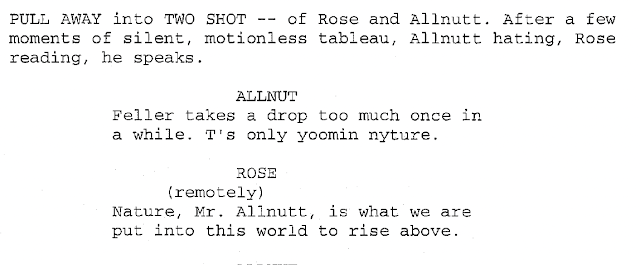 |
| "Heart of the Turbine," by the great Lewis Hine. |
As a copywriter, I've always partnered best with a certain kind of art director.
I never really cottoned to people who talked about cinematography or who were talking about frills and flourishes before the comps were even done. That always seemed to me to be putting the cart before the horse and wildly inappropriate.
There's a time to worry about details.
That time isn't when you're trying to nail down an idea.
My last partner at R\GA was one of those people who got things right.
I took to calling them, at least in my own head, "blue-collar art directors." A blue-collar art director would most definitely have left out the hyphen between blue and collar. I think Dave Trott would call them Geordies and then explain why he was Dave and David Abbott was David. In England, it might be a class thing. But here, the distinction in allegedly class-less Amerika is just as palpable.
A blue-collar art director is like a contractor who comes into your apartment to build a set of bookshelves. He has a process. He knows what to measure and measures it. He knows what to knock down. What walls need reinforcement. And how to make the thing useful, so for instance, the shelves are adjustable. Half the books I own are too big to sit in an ordinary shelf.
If you say, for instance, late in the game that you need something that hadn't been originally planned for, he doesn't fume and tsk. He's more likely to nod and get right to it. Blue-collar art directors remind me of the actor in the commercial above. In appearance, demeanor and logical approach. BTW, no one in America would shoot a commercial like that today. It would surely offend someone for some reason.
Once I was writing a script for something and when I was finished I shared it with my R\GA art director. He scribbled in a line of dialogue furtively, like he was cheating on a grade-school exam. The line was something like, "Sure, I'm about to retire, but I'm still swinging a hammer."
That line, "but I'm still swinging a hammer" makes a ton of sense to me, not only as a good piece of copy but as a code to live by.
I'm turning 66 and I see a lot of people around me--regardless of their profession--take some sort of pride in the idea that they no longer go to work with a sharpened pencil. Somehow they feel elevated that they can tell others what to do rather than doing it themselves. I've always had a code when it comes to judging people I feel I'm competing with: Never trust a copywriter who doesn't have ink stains on her hands.
In the parlance of swinging hammers, be on the lookout for un-calloused hands. That is people who don't do.
My old boss and friend Steve Simpson was one of the most-skilled, dedicated and decorated writers I ever worked for. When he hired me at Ogilvy, he ended our handshake meeting with two simple words.
"Everybody works."
I suppose it's human nature to seek to elevate yourself from the hoi polloi. We all look for ways to separate ourselves from commoners, no matter what profession we're in. We look to find ways that show the world we're better. I suppose there were cavepeople better at organizing the hunt than killing the mammoth.
That's only natural, as Charlie Allnut (Humphrey Bogart) once stuttered to Rose (Katherine Hepburn.)
That's only natural.
But Rose was still swinging a hammer.
At least a verbal one.
"Nature, Mr. Allnut," she answered, "is what we all must rise above."
I'm with Rose on this one.
She might be a "crazy, psalm-singin', skinny old maid," but I'm with her.
I think rising above trying to rise above is about as risen as you can get.

No comments:
Post a Comment